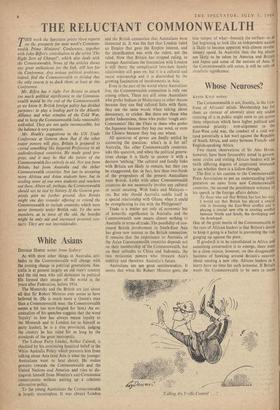THE RELUCTANT COMMONWEALTH
TILLS week the Spectator prints three reports on the prospects for next week's Common- wealth Prime Ministers' Conference, together with John Biflen's contribution to the series 'The Right Sort of Changer, which also deals with the Commonwealth. None of the articles shows any great enthusiasm for the link, still less for the Conference. Any serious political problems, indeed, find the Commonwealth so divided that the only course is to duck them, at least at this Conference.
Mr. Biflen has it right. For Britain to attach too much political significance to the Common- wealth would be the end of the Commonwealth as we know it. British foreign policy has divided purposes: to play a leading part in the Atlantic Alliance and what remains of the Cold War, and to keep the Commonwealth links reasonably well-oiled. They are not quite incompatible, but the balance is very tenuous.
Mr. Heath's suggestions to the UN Trade Conference at Geneva show that if the other major powers will play. Britain is prepared to extend something like Imperial Preference to all underdeveloped countries. He made good pro- gress, and it may be that the future of the Commonwealth lies entirely in aid. Not just from Britain, but from Australia and the richer Commonwealth countries. Not just in accepting more African and Asian students here, but in sending more of our own students and teachers out there. Above all, perhaps, the Commonwealth should not be tied by history. If the Geneva pro- posals gain no further ground, then Britain might one day consider offering to extend the Commonwealth to include countries which were never formerly under British rule. To the new members, as to most of the old, the benefits might be only aid and increased personal con- tacts. They are not inconsiderable.






























 Previous page
Previous page